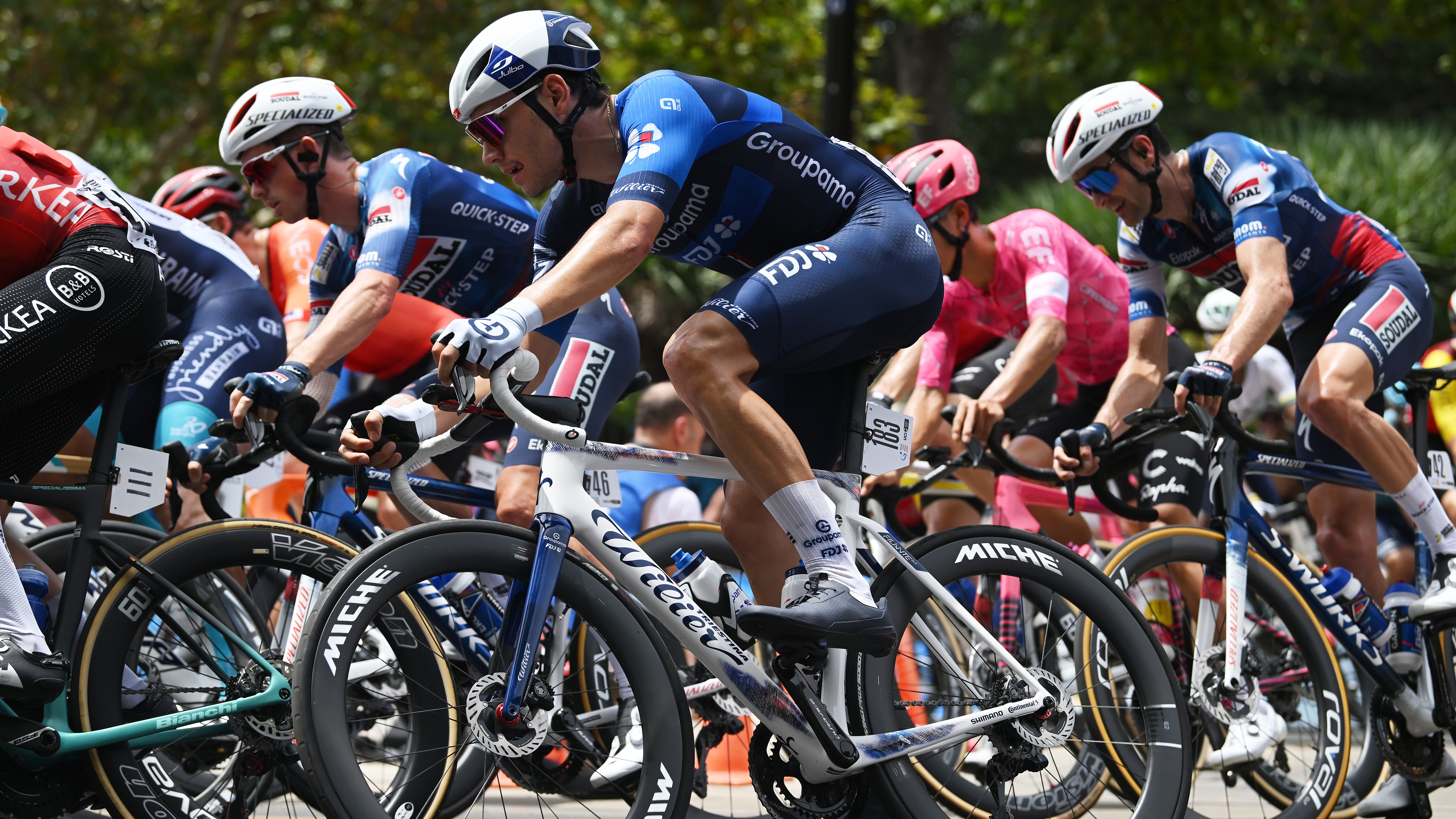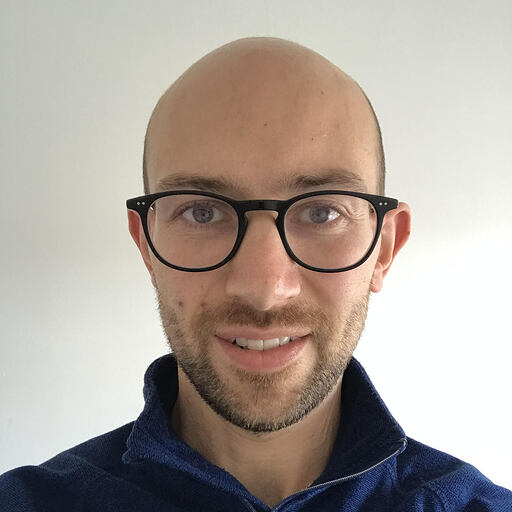'This is an investment that has been calculated' - How and why Miche overhauled Groupama FDJ's 27-year deal with Shimano
Miche CEO Gregory Girard discusses breaking into the WorldTour and Miche’s long-term plan

“We were convinced that for Miche, the only way to grow in terms of image, in terms of perceptions, was to be in the WorldTour,” says Gregory Girard, the recently appointed CEO of Miche, from the company's headquarters just north of Treviso in northern Italy.
Miche is located in an area of Italy that is home to some of the world's best-known bike brands and manufacturers. The Pinarello factory is less than an hour away, for instance. The company’s origins date back to 1919 and it prides itself on its in-house manufacturing. The majority of equipment is manufactured on-site in Italy.
Component sponsor changes for teams are announced each winter and at the beginning of each new season. Some come and go quickly, and others are decades old. Regardless, it’s exciting to see what equipment teams and riders will use each year.
Miche announced it would become the wheel sponsor to Groupama-FDJ earlier this year, in a deal that will also see them provide other components to the team for the next three years. We spoke with CEO Gregory Girard about the brand's ascendancy to the WorldTour, equipment production, testing and what it means from a business perspective to provide equipment to a WorldTour squad.

Forming a brand new partnership
The genesis of the agreement between FDJ and Miche has its origins back in 2022, the year Wilier Triestina acquired Miche and the two companies announced a new partnership. Girard joined Miche as CEO in May 2024 after 15 years at Wilier. Both are family-run companies with a rich history, but Girard explained that while Miche's manufacturing excellence was in place, the brand needed to improve its profile and marketing strategies.
"Miche was a family company. Wilier bought Miche and they decided to help the company grow step by step, without making big changes, without new managers or removing people from the company. So the idea was to say, with our experience, with our people, let's try to grow Miche as a brand and as a company."
The manufacturing side of the business was already strong, efforts were concentrated on production, capacity and improving things like the robotic CNC machines used to produce components. Improving the brand profile came next, and a relationship with a WorldTour team to develop products and increase sales was required. Partnering with a WorldTour squad as a wheel manufacturer, however, wasn't a walk in the park.
Get The Leadout Newsletter
The latest race content, interviews, features, reviews and expert buying guides, direct to your inbox!
"We started to have discussions with different teams two years ago. It's not an easy task, first of all, there are not many WorldTour teams. Many of those teams already have long-term contracts. Some like Specialized, like Trek, Scott, and Cube, have their private brand for wheels, [in-house wheel brands like Roval and Bontrager] so those teams were already excluded from the beginning.
"We focused our efforts on the teams that could be available. Then came the second issue, of the available teams many of them are already working with big brands of wheels. So you arrive as Miche, as the small one, and you show your products, you start to discuss the financial parts, but it was not easy."
Groupama FDJ switched from Lapierre to Wilier bikes in late 2024, but Wilier's subsequent acquisition of Miche did not automatically throw open the doors to team sponsorship. Girard stresses the value of the continued relationship with Shimano and the team and riders' reluctance to switch to an unfamiliar product.
"I have to say there was a kind of wall from the team. The main issue was the fact that Groupama has been working with Shimano since the creation of the team in 1997 so it was a 27-year sponsorship, directly with Shimano. The team was happy with the material, happy with the connection with the Shimano staff, and happy about the support. So at that moment, they didn't see any reason to switch to another brand."
Wilier's ownership of Miche helped shape the conversation and Girard himself acknowledges the sponsorship wouldn't have happened without it. However, the WorldTour is the Formula 1 of the cycling world, and marginal gains have been taken to a different plane entirely in the last few years. Groupama wouldn't have accepted a lesser product to race on at the sport's top level.
"They [the team] said 'The first point before speaking about what you can offer in terms of finance etc is that you have to show us that your wheels are technically at least on the same level as our Shimano Dura-Ace wheels.' So this was the start of the process.
"When they asked us to show that the wheels were at least as good as Shimano's. It was first of all in terms of aerodynamics.
"The second step, if the first one was okay, was that the wheels would be tested by two riders out of races and blind. Those two riders needed to say that the wheels were good, at least as good as the Shimano ones."
The riders testing the wheels at first apparently did not know what they were using to avoid any placebo effects or predispositions about a certain brand or product.

Tech and testing
Girard explained that wind tunnel testing at the Abus tunnel in Germany combined with real-world riding from two trusted riders with an excellent feel for equipment informed the team's decision. The wind tunnel testing included testing bikes and wheels, including competitors, as a complete system across a range of yaw (wind) angles, mainly 5-15 degrees.
"Regarding the wind tunnel, we had to develop a specific product, because to be honest, with the previous product, we were a bit behind Shimano.
"Then with the development of the Kleos RD, our top-level wheel. Our wheels were a bit better in the wind tunnel, with respect to Shimano. The second step was on the road. Test riders tried all three wheel depth profiles, the 36, 50 and 62mm. The riders preferred two of the profiles and thought one didn't make much of a difference.
"At the time, we knew that Shimano was not so happy about it, because they wanted to stay in the team. So we had a lot of discussions with Shimano to try to find an agreement that could fit both parties." Girard explained.
An agreement was indeed reached for the team to ride Miche's wheelsets. The brand will also supply thru-axles, bottom brackets, computer mounts and 60-68 tooth chainrings for time trials - Shimano doesn't currently offer the very large chainring sizes that are common at WorldTour level, another WordTour team also approached Miche for Shimano-compatible, large-size chainrings over a year ago for this same reason.
Miche recently added a fifth assembly line at its factory to meet the required additional production demands. It manufactures all the hub shells for its wheels in-house and even machines titanium freehub bodies for its top-line Kleos range, Girard explains the right tooling is needed to machine the hard titanium material. Aero-bladed spokes are also shaped in-house by Miche themselves. As for the wheels, the carbon manufacturing is done in Asia, but Miche uses its own moulds, All assembly is then taken care of in Italy at the factory.

A calculated investment
If a team is happy with a prospective sponsor product, the second part of the equation is calculating - or at least trying to anticipate - the return a brand can expect to see on its investment as a result of increased exposure and brand awareness.
It's been the same for a long time in cycling, people generally want to use or are at the very least interested in what the pros race on.
"The first step was to make a calculation of the full cost of the investment and then to make different business plans. What about if the first year we sell 1% more of this category of product. What about if we sell 10% more of this category of product? We expect to sell more wheelsets, we also expect that the visibility of Miche as a brand will help us to sell more cassettes, more bottom brackets, and more computer holders.
"We had to make all the calculations to understand where the break-even point is. How much do we need to sell to at least cover the cost, how much do we need to sell to see the benefits, or for instance when will we need to invest in another machine if our production capacity is not enough." Girard explained.
Miche produced two business plans for the coming years, one factoring in the investment of supplying a WorldTour team and one without. Girard stresses the need to make a considered, controlled investment. In 2024, the company had a turnover of around 10 million euros, Girard explains a smaller brand like Miche has more space and more room to grow and build, whereas a brand at the top potentially has a harder time remaining profitable in the current market.
"We wanted to be safe, we want to be sure that, at the end of the year, if profits are lower, the company remains safe, the company remains healthy, we can keep all employees on board because this is a family company. This is something super important."
It sounds like manufacturing ability has always been a strong suit for Miche, and the brand is first and foremost proud of what it still manufactures in Italy with a workforce of under 50 staff.
"We are very proud to have the production in Italy. We are 42 people total, of which 27 are in production. For us, there is no plan to go outside of Italy, for some products [carbon rims] we have suppliers in Asia. We are proud of this 'Made in Italy' tag."
It sounds like Miche is already planning for the future and developing new wheelsets for the coming years to stake its claim and rival other big brands. It seems the product matters and their use by some of the fastest cyclists on the planet will now mean no stone is left unturned in the search for performance.
"Now we are looking for every single marginal gain because we can understand how we can improve, how many watts you can save, how many kilometres an hour you go faster. For Miche, our products will be better in the future due to this collaboration."

Tom joined the Cyclingnews team in late 2022 as a tech writer. Despite having a degree in English Literature he has spent his entire working life in the cycling industry in one form or another. He has over 10 years of experience as a qualified mechanic, with the last five years before joining Cyclingnews being spent running an independent workshop. This means he is just as happy tinkering away in the garage as he is out on the road bike, and he isn’t afraid to pull a bike apart or get hands-on with it when testing to really see what it’s made of.
He has ridden and raced bikes from an early age up to a national level on the road and track, and has ridden and competed in most disciplines. He has a keen eye for pro-team tech and enjoys spotting new or interesting components in the wild. During his time at Cyclingnews, Tom has already interviewed some of the sport's biggest names including Mathieu van der Poel, Tadej Pogačar and Alberto Contador. He's also covered various launches from brands such as Pinarello, Ridley, Specialized and more, tackled the Roubaix Challenge sportive aboard his own rim-brake Cannondale SuperSix Evo, tested over 20 aero helmets in the wind tunnel, and has created helpful in-depth buying advice relating to countless categories from torque wrenches to winter clothing.